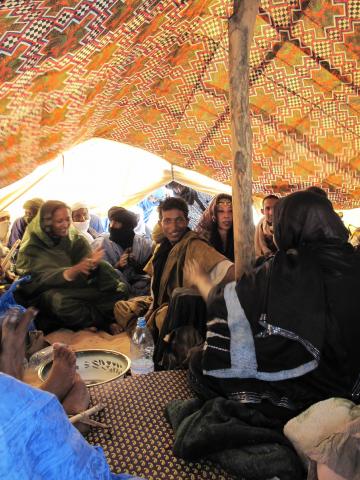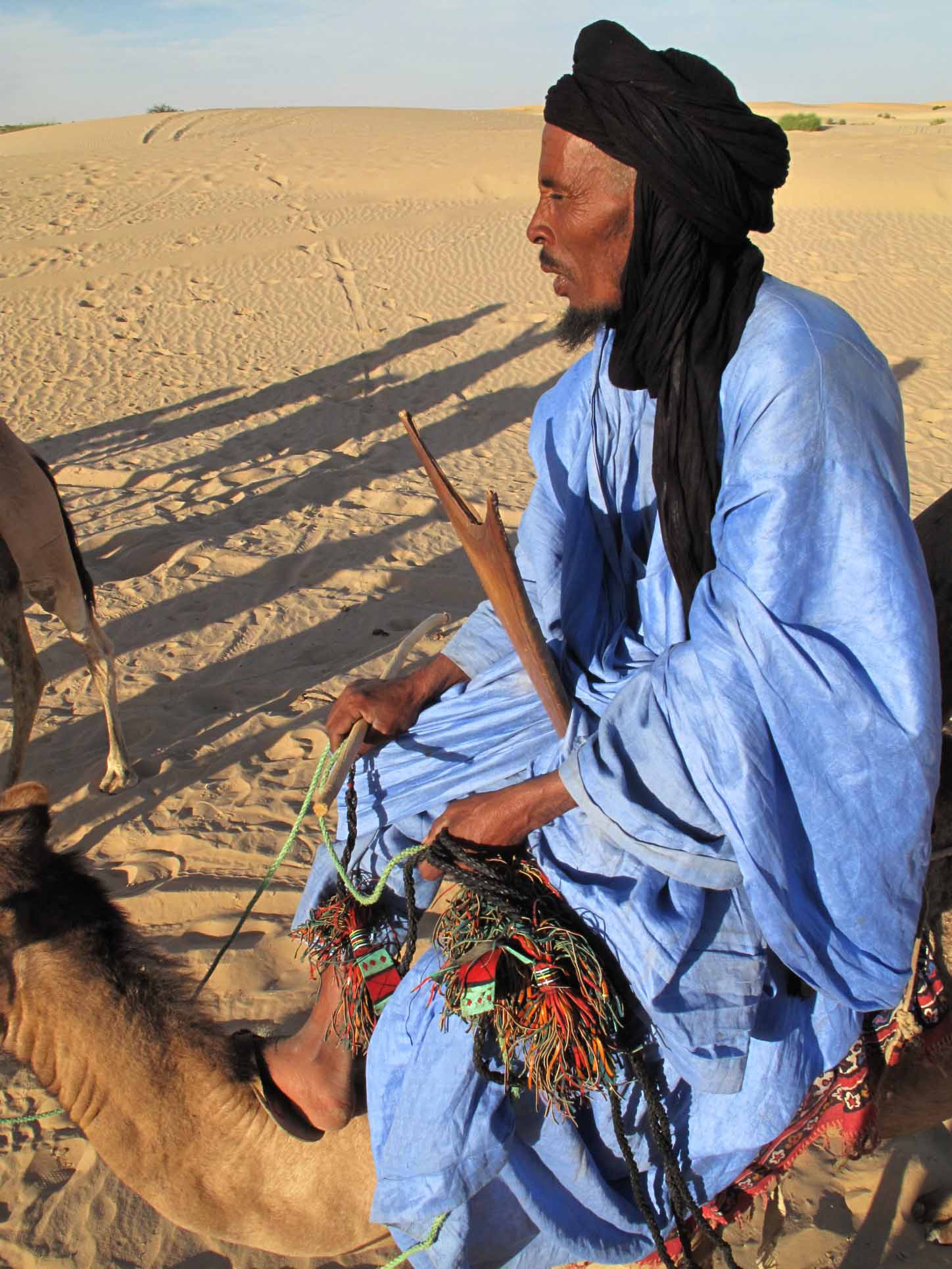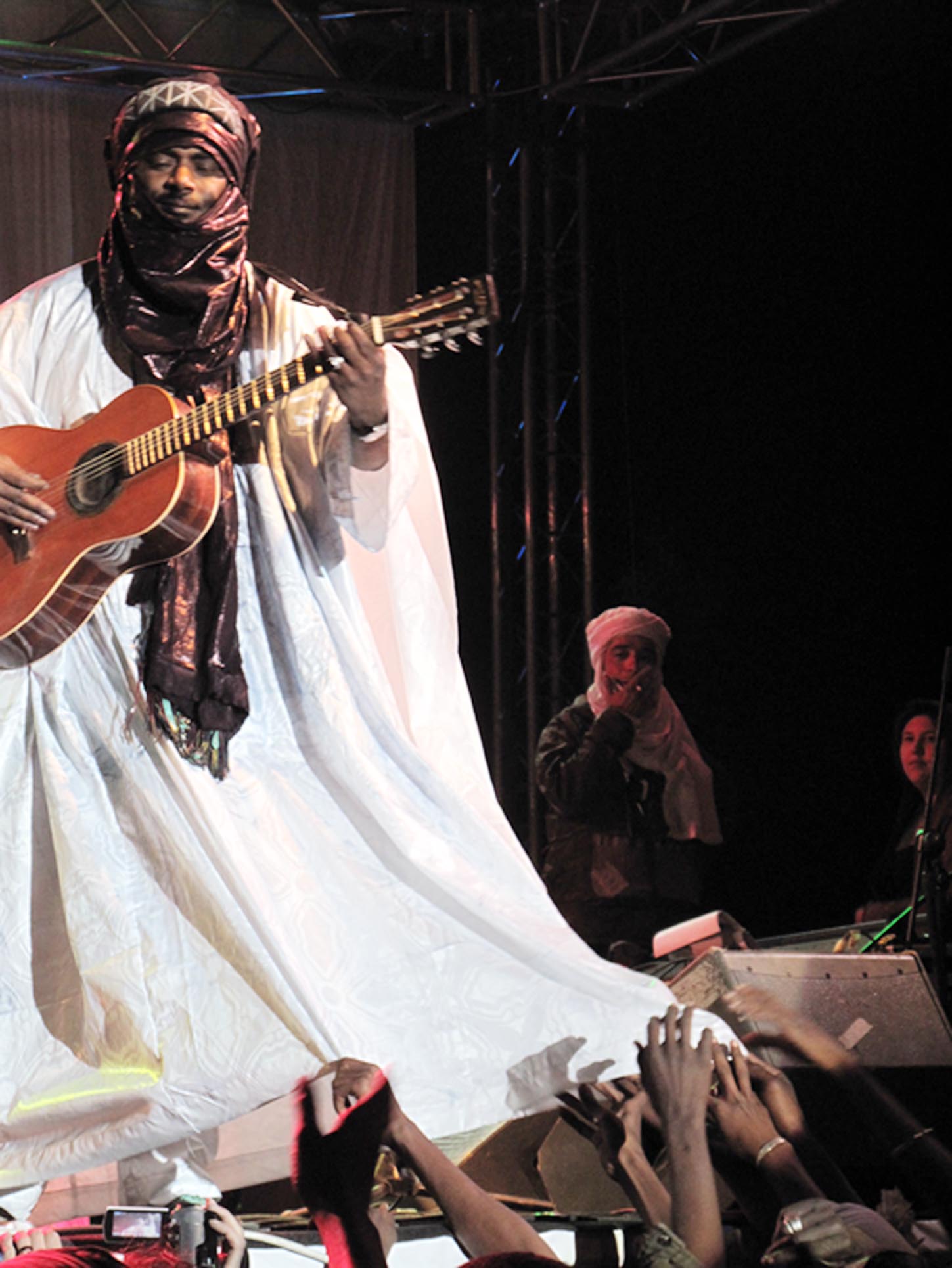The Festival au Desert must go on

The threat of hijackings did not deter the Malian authorities from hosting one of the biggest earners in the tourist calender, nor from Tom Rowe checking out the nomadic vibes at the Festival au Desert, in the surrounds of the exotic Saharan lanscape.
In typical Malian fashion, the government says what they think you want to hear. "Northern Mali is no more dangerous than certain parts of European cities", said the Minister for Tourism recently, in the same breath explaining why a music festival had to be moved from Essakane, an oasis 60 km from Timbuktu, to almost within walking distance of the fabled city.
This year, a last minute change of location was forced by the the threat of kidnappings and beheadings of tourists by a group styling themselves Al-Qaeda in the Islamic Maghreb. The 60 km to Essakane would have taken three-hours by car through the dunes - ample opportunity to grab a tourist convoy in transit.
{Left: An impromptu concert takes place in a Tuareg tent}
The Festival au Desert is a mainstay of the Malian tourist industry, in a country that desperately needs to diversify its economy. Over 70% of the population is involved in agriculture, yet over 65% of the country is semi-desert. Mali is one of the poorest nations in the world.
Over the 10 years since the Festival was founded to celebrate a peace accord between the nomadic Tuareg tribe and the national government, it has attracted thousands of foreigners and a host of international acts, as well as gaining a reputation as the festival to beat all festivals, at least in terms of exotic location. It is normally some distance from Timbuktu, a city many Westerners still think of as an imaginary place. Yet Timbuktu exists, a hot, sandy outpost hours from anywhere, as it has done for centuries.
The deserts of Northern Mali, beginning at Timbuktu, stretch north into the vastness of the Sahara as far as Morocco, Egypt and Sudan. The Tuareg, a tall race of nomads who still bring the camel caravans of rock salt across the sands to Timbuktu, are most at home in the region. The Festival Au Desert is a modern, souped-up approximation of a traditional Tuareg festival, and much of the crowd is made up of Tuaregs. The men come on their camels, dressed head to toe in blue robes and turbans, carrying swords. The women wear black and have their hair-coverings adorned with silver. Their music and singing is the soundtrack to the festival, but Malian musicians from other ethnic backgrounds and international acts also play a significant part.
While the Tuareg still herd camels and goats and transport rock salt, tourism is now a major part of their livelihood. One aging Tuareg named Mohammed told me that 'It is dangerous for me. I take salt from the mines to Timbuktu and they attack the camel caravans to see if we have tourists with us. I have seen them a lot in the desert', referring to what he called the 'Arabs'.
 {Left: Mohammed - A Tuareg who carries rocksalt from the mines to Timbuktu}
{Left: Mohammed - A Tuareg who carries rocksalt from the mines to Timbuktu}
The 'Arabs' are Al-Qaeda in the Islamic Maghreb (AIQM), Sunni Islamists operating in Mali, Morocco, Mauritania and Algeria. Formerly known as the Salafist Group for Preaching and Combat, it has taken responsibility for a number of terrorist attacks in the region, declared its intention to attack Western targets and sent a squad of jihadis to Iraq.
AIQM originated as an Islamist resistance movement to the secular Algerian government, splitting from the Armed Islamic Group (GIA) in 1998 to become the GSPC, the primary force for Islamism in Algeria. Membership has fallen to the hundreds according to the US State Department, but kidnappings to raise money are on the rise. The connection to Al-Qaeda is not a new phenomenon, as Osama Bin Laden provided funding for Algerian Islamists in the early 1990's, and many of AIQM?s founding members trained in Afghanistan. The official merger with Al-Qaeda came with a videotaped approval given in 2006 by Ayman al-Zawahiri, Bin Laden's second in command.
 {Right: Tinawaren - A popular Tuareg band play the main stage}
{Right: Tinawaren - A popular Tuareg band play the main stage}
The group has carried out a large number of attacks on government targets in Algeria and several kidnappings in the region, with victims usually being held in the largely ungoverned regions in northern Mali. Algerian forces are cracking down in their country, but the Malian army is sorely underfunded. Ransoms have been paid in several kidnapping cases, then used to buy arms.
Experts are divided over the capability of AIQM to launch an attack in Europe or North America as it has threatened. It has not managed to do so in its years of existence, but has been steadily building up its capabilities, with cells being discovered in Paris in 2007 and Spain in 2008 and arrests made throughout Europe in the past decade.
But the festival-goers who braved the long trek to Timbuktu did not seem to have Al-Qaeda on their minds. Those that stayed away this year took the advice of their governments. Those who came were mostly concerned with dancing, haggling and getting the best part of the goat at the barbeque. And at least the Malian army was patrolling the dunes in their Toyota trucks, staring out into the desert all around us.
